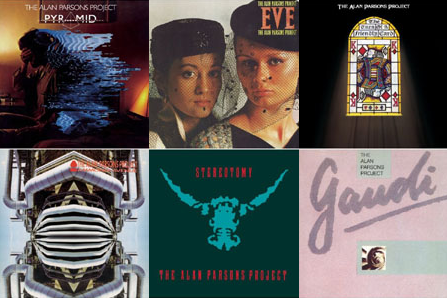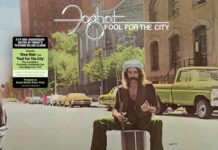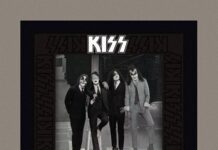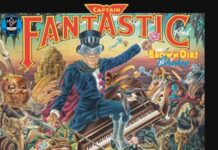Beginning as a ‘tea-runner’ at Abbey Road studios, Alan Parsons graduated to engineering albums like the Beatles’ Let It Be and Pink Floyd’s The Dark Side Of The Moon. Songwriter, piano player, vocalist, producer and manager for such notables as
Carl Douglas (remember “Kung Fu Fighting”?), Eric Woolfson met Parsons when the former was looking for a manager. It took no time at all for the two to begin working together in earnest with Woolfson quickly creating the idea of a concept album based on the works of Edgar Allan Poe. That album, Tales Of Mystery And Imagination, and the follow-up, I Robot, are still my favorite Alan Parsons Project releases, showcasing not only the pair’s musicianship and songwriting but a progressive rock sensibility as well. Now, the albums that followed — Pyramid, Eve, The Turn Of A Friendly Card, Ammonia Avenue,
Stereotomy and Gaudi — have been reissued with previously unreleased bonus tracks. This entire project was overseen by Parsons and Woolfson in hopes of satisfying fans and maybe a whole new listening audience.
Pyramid
God I love old Alan Parsons! Pyramid, released in 1978, starts just as I want an Alan Parsons Project to start an album, with a spacy instrumental “Voyager,” leading into a more poppy, singable “What Goes Up,” featuring a great David Paton vocal. All the usual ‘project’ guys are here besides Woolfson and Parsons — Ian Bairnson on guitar, Stuart Elliot on drums, Duncan Mackay on synths and various vocalists, including Colin Blunstone, Paton (who also plays bass) and Lenny Zakatek. “The Eagle Will Rise Again” follows, this time with Blunstone contributing a fantastic vocal. That’s the thing with Alan Parsons — he knew enough when to get the right vocalist for the right song. Sometimes Woolfson sang (and he’s got a great voice), sometimes not.
“One More River” is passable with no offense to vocalist Lenny Zakatek. I just have never felt The Alan Parsons Project were at their best
when they attempted heavier tunes. Which is why I can’t get behind “Can’t Take It With You,” though it’s harmless and poppy. I love the instrumental “In The Lap Of The Gods” with its Mid-Eastern flavor, slightly pretentious slow start, Woolfson’s spot-on piano work, the frantic orchestral arrangements and dramatic backing vocals. “Pyramania” is fun staccato pop and “Hyper-Gamma-Spaces” is just what the title implies: a hyper, arpeggiated instrumental. The slightly Supertramp/Saga flavored “Shadow Of A Lonely Man” ends it all. The Pyramid reissue includes six bonus demos and early versions of some of the album’s original tunes.
Eve
“Lucifer” is a spectacular instrumental that opens Eve, the fourth APP album released in 1979. This tune and album both hit Number One, and it’s no surprise as both are perfect Parsons pieces with a deep conceptual core (about women actually). The light pop of “You Lie Down With Dogs,” “You Won’t Be There,” “Winding Me Up” and “Don’t Hold Back” (featuring Clare Torry on lead vocals) counter the drive of “I’d Rather Be A Man,” featuring a cool backwards wah wah guitar from Ian Bairnson and cutting vocals from David Paton, and the hit “Damned If I Do,” with Lenny Zakatek turning in a great vocal performance. “If I Could Change Your Mind,” the record’s final song, might be the prettiest number here, with Lesley Duncan on lead vocals. Eve was one of the few APP albums to feature two female vocalists.
As on all of these CDs, there are bonus tracks, mostly rough mixes of previous tunes. There’s a gem called “Elsie’s Theme from The Sicilian
Defence,” an angelic solo piano piece and perhaps the most beautiful song in the APP canon. Not originally included on this album (or anywhere else), “The Sicilian Defence” was supposed to be the title track of a second album recorded at the same time as Eve. A disagreement with the record company caused the project to be shelved. This unreleased track is dedicated to Eric Woolfson’s granddaughter. It’s so gorgeous, you wonder what would have been had the group released it.
The Turn Of A Friendly Card
The Turn Of A Friendly Card, APP’s fifth album released in 1980, has gambling, casinos and high lifestyles as its central theme. Two of the biggest early Alan Parsons’ singles come from this one: “Games People Play” and the absolutely exquisite “Time” (featuring one of the best Eric Woolfson vocal performances ever). There’s a bit of a Giorgio Moroder feel here as evidenced in the opening track, “May
Be A Price To Pay.”Overall, however, this is one fantastic release. I love the harpsichord and clavinet (played by Parsons) on the very Wakemanian “The Ace Of Swords.” Next to “Time,” this might be my favorite track. “Snake Eyes” is good and funky, again with Bairnson in great form and Chris Rainbow turning in a good vocal. Woolfson puts in another great vocal turn on “Nothing Left To Loose” and the softer “Card
(Part Two).”
Of course, there are bonus tracks, basically early mixes and demos of the ‘regular’ album tracks, worth listening to and comparing released versions. The most interesting extra I think is the Beach Boys-like early demo of “Time,” which shows you what these guys were capable of vocally. The Turn Of A Friendly Card was a stellar release for APP to kick off the decade with and yards ahead of Eve.
Ammonia Avenue
A concept album like most of the other Parsons’ releases, this 1984 album saw APP enjoy continued success with the singles, most notably the huge MTV darling “Don’t Answer Me” and “Prime Time,” which features great guitar work from Ian Bairnson (who’s all over this release).
There are some rather tepid tries at 80s pop with the tunes “One Good Reason” and “Dancing On A Highwire,” the electric gospel-flavored
“Since The Last Goodbye” with Chris Rainbow’s great vocal, and the lengthy title track featuring the Philharmonia Orchestra.
But for me, it’s the aforementioned “Don’t Answer Me” with those great subtle Stuart Elliot castanets clicking under Bairnson and
David Paton’s acoustic guitars, along with the amazing sax work of Mel Collins and those wonderful Eric Woolfson vocals that make AA from AAP worth having. As with Stereotomy before it, I am afraid the guys had yet to shed the trappings of an 80s sound that simply did not fit them…in my humble opinion. Attempting some ecological laden lyrics here and though producing a huge hit, Ammonia Avenue seems to cover that same tonal ground as its predecessor. Like all the rest of these expanded editions, this one features some extras: a very rough “Don’t Answer Me,” two versions of “You Don’t Believe” (a demo and an instrumental tribute to the Shadows), and orchestral overdubs for the title track.
Stereotomy
Nineteen eighty-six saw The Alan Parsons Project influenced (perhaps a little too much for my tastes) by the musical climate of the time. Starting with the title track (featuring some cool beginning percussion) “Beaujolais” (almost Duran Duran territory) through to the forgettable “In The Real World,” I’m not sure I can say very many good things about APP’s ninth album other than, hey, these guys play well. The tunes I like are a bit too few for me (yeah, blame my old prog sensibilities). This really isn’t The Alan Parsons Project I had become accustomed to. I know every band has to grow, but even instrumentals like “Urbania” and “Where’s The Walrus” don’t stray far from the mid 80s tinny synth sounds, overly snappy snares and vocal effects.
There’s a great guest vocal from Procol Harum’s Gary Brooker on “Limelight.” It’s a sweet song, but aside from the vocals, certainly not on a par with classic APP. Even Ian Bairnson can’t save this collection. I would be hard pressed to find a saving grace here. Maybe Graham Dye’s unusual vocal on “Light Of The World” or Bairnson’s guitars in “Chinese Whispers,” a too-quick instrumental that closes the record. But these two high points can’t help what I feel is the weakest CD of the lot. Thankfully, the bonus material is light with only four songs, including an instrumental demo of “Rumor Goin’ Round,” which didn’t make the original cut.
Gaudi
As he had with Poe way back when, Eric Woolfson found inspiration for Gaudi, the eleventh Alan Parsons Project album, from one of his heroes, Spanish art Nouveau architect Antonio Gaudi. The opener “La Sagrada Familia” is perfect really, with a fantastic and heart-rendering vocal from John Miles, played light with dark shading from the usual band mixed (like only Parsons could mix them) with an orchestra and choir conducted and arranged by Andrew Powell. “Too Late” features Lenny Zakatek turning in another one of his great vocals. It might be a little light, but as is the case with most of Gaudi, even the weaker songs seem to shine. Maybe the band felt renewed with a stronger sense of purpose or maybe they even knew this would be Woolfson’s last outing or the subject matter required a more maturetouch. Woolfson sings his heart out on “Closer To Heaven,” quitea poignant song considering this would be The Alan Parsons Project’s last album. When I hear Woolfson sing, I realize that it is his voice that I have come to recognize as one of the most crucial components of APP’s sound.
Even though The Alan Parsons Project features some great singers, it is Woolfson’s voice I want to hear most. The semi-hit “Standing On Higher Ground” is harmless enough. “Money Talks” is another attempt for APP to try and sound harder. “Inside Looking Out” (featuring Woolfson)
is like “Time” off of The Turn Of A Friendly Card, a solid example of what The Alan Parsons Project could be — lush songwriting aided by a well-played, subtle production. The big instrumental “Paseo De Gracia” ends the record, bringing us back to the theme and musical motifs heard on the opening track. The severn bonus tracks consists of demos, rough mixes and overdubs.
There’s no better way to get your fill of “prime time” Alan Parsons Project than to pick up these new six expanded reissues. Though they
may have waffled in style and tone over the course of their decade-long partnership, Alan Parsons and Eric Woolfson made some spectacular music together.
~ Ralph Greco, Jr.




















